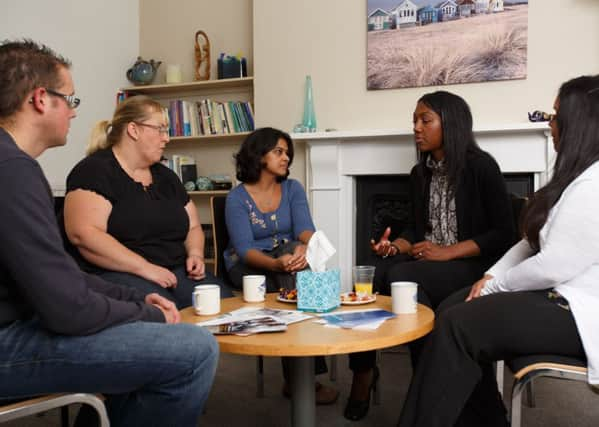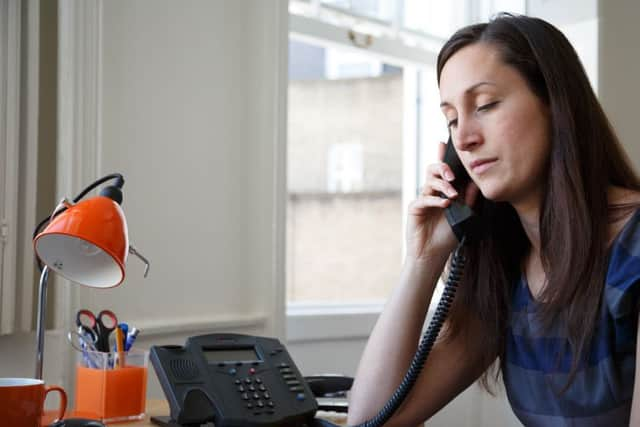A time for bereaved Scottish parents to remember


That’s what the Stillbirth and Neonatal Death charity (Sands) is calling for the governments of the UK’s four nations to provide.
Sands is leading a coalition of more than 60 charities working to prevent baby deaths and pregnancy loss. Jointly, they are urging all NHS Trusts and Boards to improve bereavement care for parents across the UK.
Advertisement
Hide AdAdvertisement
Hide AdThe call comes during Baby Loss Awareness Week, which runs from October 9 to October 15.


The week also marks the roll-out of the National Bereavement Care Pathway (NBCP), a partnership between the charities, governments and the NHS.
The pathway sets out standards for providing excellent care to anyone affected by pregnancy and baby loss.
This year is also Sands’ 40th anniversary, providing support to parents who have suffered a bereavement.
Advertisement
Hide AdAdvertisement
Hide AdWhile there have been many improvements since 1978, unfortunately, inconsistencies still remain across the UK.
Marc Harder, the NBCP project lead for Sands, said: “Standards of care across the country right now are very much inconsistent.
“We want those in power to ensure that bereaved parents get the best possible care, wherever they live and wherever they present themselves – whether that be A&E, a maternity unit or early pregnancy unit.
“Sadly, health care professionals don’t always have the training they need to speak to bereaved parents.
Advertisement
Hide AdAdvertisement
Hide Ad“In an audit we carried out last year, only 46 per cent of Trusts with maternity units provided mandatory bereavement training.
“And of those 46 per cent, 86 per cent of them only provided their staff with one hour or less of bereavement training each year.
“That means staff don’t always know how best to deal with bereaved parents.
“It’s an issue that really needs to be addressed in terms of improvements.
Advertisement
Hide AdAdvertisement
Hide Ad“Not having the correct terminology to speak to parents can be a real barrier in providing bereavement care for them.
“Often it’s simply because staff don’t know how to communicate with the parents – and that’s down to a lack of training.”
And there are other areas where there is also much room for improvement.
Sands, for example, would like to see the day when every hospital in the country offers separate family rooms for bereaved parents.
Advertisement
Hide AdAdvertisement
Hide AdWhile the charity already helps hospitals fundraise for such facilities, too few are readily available now.
Marc explained: “These special suites enable parents to receive the care they need after the loss of their baby – away from a busy labour ward where other parents are celebrating the births of their children with families and friends.
“Some parents do receive really good care, away from the cries of other newborn babies, but far too many are still treated in labour wards, surrounded by other parents with healthy babies.
“Inconsistencies in care exist even within the same hospital trust, as well as town to town, city to city and country to country.”
Advertisement
Hide AdAdvertisement
Hide AdAnd that’s why the NBCP was developed – to ensure every family suffering the loss of a child receives the same level of care.
Marc said: “It provides a framework to ensure that health professionals are equipped with all the tools they need to provide excellent bereavement care, no matter where they work or live in the country.
“It has been piloted in a number of sites in England and an evaluation has now been done, with feedback from parents and professionals.
“So we are confident that the tools, guidance and research within the pathway can be used across the country to provide greater consistency in bereavement care for parents.”
Advertisement
Hide AdAdvertisement
Hide AdSands’ 40th anniversary AGM will be held in Glasgow in November.
Marc added: “In the next 18 months, we have the opportunity to really make a difference in Scotland.
“We have come a long, long way since 1978 but we’ve still got a way to go.
“We long for a world in which there is no baby loss.
“Until then we’ll continue to work to ensure parents receive the best possible care they can during their bereavement journey.”
Scottish Government funding lays pathway to improvements
Advertisement
Hide AdAdvertisement
Hide AdIn April this year, the National Bereavement Care Pathway (NBCP) for pregnancy and baby loss was extended to Scotland, thanks to £94,000 in funding from the Scottish Government.
Sands is working with the Scottish Government, a number of baby loss charities and other health care partners in Scotland to develop the approach over the next two years, with the plan to pilot, implement and embed the NBCP across Scotland by March 2020.
Five experiences of pregnancy or baby loss are included in the NBCP including miscarriage, termination of pregnancy for foetal anomaly, stillbirth, neonatal death and the sudden unexpected death of an infant up to the age of 12 months.
Health Secretary Shona Robison said: “The funding will allow implementation of the National Bereavement Care Pathway in pilot sites across Scotland and ensure all bereaved parents are offered high quality, sensitive bereavement care.”
Advertisement
Hide AdAdvertisement
Hide AdThe development of the NBCP in Scotland is being overseen by a Scottish steering group.
Kate Mulley, director of research, education and policy at Sands, said: “We are extremely grateful for the support of the Scottish Government and Sands support groups in Scotland who have contributed to the funding of this vital project which will make such a difference to so many families.”
Forty years ago, two bereaved mothers, Bel Mooney and Hazelanne Lewis, found there was no support available. So they founded Sands in 1978.
At that time, most parents were not allowed to see, hold or bury their babies and they could not put their babies’ names on the stillbirth certificate.
Advertisement
Hide AdAdvertisement
Hide AdSands is now the leading stillbirth and neonatal death charity in the UK. It works to reduce baby deaths through promoting better maternity care and funding research.
The charity offers training and comprehensive bereavement support, both nationally through its helpline – 0808 164 3332 or via email at [email protected] – and locally via some 100 regional support groups.
Further information can be found at www.sands.org.uk.